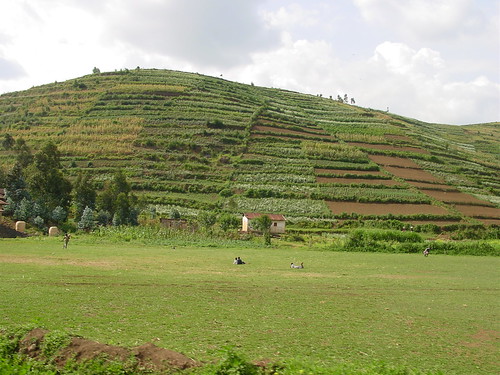

Is Ecological Agriculture Productive?
By Lim Li Ching, Researcher, Third World Network (November 2008)
A key question that is often asked about ecological agriculture, including organic agriculture, is whether it can be productive enough to meet the world’s food needs. While many agree that ecological agriculture is desirable from an environmental and social point of view, there remain fears that ecological and organic agriculture produce low yields.
This short paper will summarise some of the available evidence to demystify the productivity debate and demonstrate that ecological agriculture is indeed productive.
In general, yields from ecological agriculture can be broadly comparable to conventional yields in developed countries. In developing countries, ecological agriculture practices can greatly increase productivity, particularly if the existing system is low-input, which is the largely the case for Africa. This paper will focus mainly on evidence from developing countries.
Evidence from global modelling
A recent study examined a global dataset of 293 examples and estimated the average yield ratio (organic : non-organic) of different food categories for the developed and developing world (Badgley et al., 2007). For most of the food categories examined, they found that the average yield ratio was slightly less than 1.0 for studies in the developed world, but more than 1.0 for studies in developing countries.
On average, in developed countries, organic systems produce 92% of the yield produced by conventional agriculture. In developing countries, however, organic systems produce 80% more than conventional farms.
With the average yield ratios, the researchers then modeled the global food supply that could be grown organically on the current agricultural land base. They found that organic methods could hypothetically produce enough food on a global per capita basis to sustain the current human population, and potentially an even larger population, without putting more farmland into production.
Moreover, contrary to fears that there are insufficient quantities of organically acceptable fertilizers, the data suggest that leguminous cover crops could fix enough nitrogen to replace the amount of synthetic fertilizer currently in use.
This model suggests that organic agriculture could potentially provide enough food globally, but without the negative environmental impacts of conventional agriculture.

Evidence from reviews of ecological agriculture projects
In a review of 286 projects in 57 countries, farmers were found to have increased agricultural productivity by an average of 79%, by adopting “resource-conserving” or ecological agriculture (Pretty et al., 2006).
A variety of resource conserving technologies and practices were used, including integrated pest management, integrated nutrient management, conservation tillage, agroforestry, water harvesting in dryland areas, and livestock and aquaculture integration into farming systems. These practices not only increased yields, but also reduced adverse effects on the environment and contributed to important environmental goods and services (e.g., climate change mitigation), as evidenced by increased water use efficiency and carbon sequestration, and reduced pesticide use.
The work built on earlier research, which assessed 208 sustainable agriculture projects. The earlier research found that for 89 projects for which there was reliable yield data, farmers had, by adopting sustainable agriculture practices, achieved substantial increases in per hectare food production - the yield increases were 50-100% for rain-fed crops, though considerably greater in a number of cases, and 5-10% for irrigated crops (Pretty and Hine, 2001).
Disaggregated data show:
- Average food production per household rose by 1.7 tonnes per year (up by 73%) for 4.42 million small farmers growing cereals and roots on 3.6 million hectares.
- Increase in food production was 17 tonnes per year (up 150%) for 146,000 farmers on 542,000 hectares cultivating roots (potato, sweet potato, cassava).
- Total production rose by 150 tonnes per household (up by 46%) for the larger farms in Latin America (average size 90 hectares).
The database on agricultural sustainability (comprising the 286 projects) was reanalyzed to produce a summary of the impacts of organic and near-organic projects on agricultural productivity in Africa (Hine and Pretty, 2008). The average crop yield increase was even higher for these projects than the global average (79%): 116% increase for all African projects and 128% increase for the projects in East Africa.
For Kenyan projects, the increase in yield was 179%, for Tanzanian projects 67% and for Ugandan projects 54%. Moreover, all case studies that focused on food production in this research where data have been reported, showed increases in per hectare productivity of food crops, which challenges the popular myth that organic agriculture cannot increase agricultural productivity.
READ THE REST AT: http://www.twnside.org.sg/title2/susagri/susagri064.htm

Etiquetas: Alternativas, Organic, Third World Network

0 Comentarios:
Publicar un comentario
Suscribirse a Comentarios de la entrada [Atom]
<< Página Principal